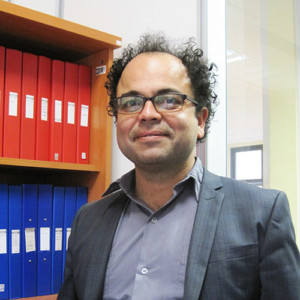Sub-topic 2. Sustainable & inclusive urban prosperity & opportunities for all
This discussion is now closed. Thank you for your participation.
Moderators:
-
 Claudio Torres Slum Upgrading Consultant, Housing and Slum Upgrading Branch. UN-Habitat
Claudio Torres Slum Upgrading Consultant, Housing and Slum Upgrading Branch. UN-Habitat -
 Pireh Otieno Human Settlements Officer, Urban Basic Services Branch - UN-Habitat
Pireh Otieno Human Settlements Officer, Urban Basic Services Branch - UN-Habitat -
 Kulwant Singh Regional Advisor - UN-Habitat
Kulwant Singh Regional Advisor - UN-Habitat -
 Marcus Mayr Urban Planner, Climate Change Planning Unit, UN-Habitat
Marcus Mayr Urban Planner, Climate Change Planning Unit, UN-Habitat -
 Edmundo Werna Head of Unit at Sectoral Policies Dept. ILO
Edmundo Werna Head of Unit at Sectoral Policies Dept. ILO
Sub-topic 2. Sustainable & inclusive urban prosperity & opportunities for all
Please post your comments in the forum here after 20 July 2016 or send to: support@habitat3.org
SUSTAINABLE & INCLUSIVE URBAN PROSPERITY & OPPORTUNITIES FOR ALL
We recognize that sustained, inclusive, and sustainable economic growth, with full and productive employment and decent work for all, is a key element of sustainable urban development and that cities and human settlements should be places of equal opportunities allowing people to live healthy, productive, prosperous and fulfilling lives.
We recognize that urban form and infrastructure design are among the greatest drivers of cost efficiencies, through clustering co-benefits, and fostering energy efficiency, resilience, productivity, environmental protection, and sustainable growth in the urban economy.
We commit to develop vibrant, sustainable, and inclusive urban economies, building on endogenous potentials, competitive advantages, cultural heritage and local resources, as well as resource efficient and resilient infrastructure, promoting sustainable and inclusive industrial development and fostering an enabling environment for businesses and innovation, as well as livelihoods.
We commit to strengthen the role of affordable and sustainable housing, including social habitat production, in economic development, and the contribution of the sector in stimulating productivity in other economic sectors, recognizing that housing enhances capital formation, labor productivity, income, employment generation and savings, and can contribute to driving sustainable and inclusive economic transformation at the national, sub-national, and local levels.
We commit to strengthen national, sub-national, and local institutions to support local economic development, fostering integration, cooperation, coordination, and dialogue across levels of governments and functional areas and relevant stakeholders.
We commit to facilitate effective participation and collaboration among all stakeholders, including local governments, the private sector, civil society, women and youth organizations, as well as those representing persons with disabilities, indigenous peoples, professionals, academic institutions, trade unions, employers’ organizations, migrant associations and others, in ascertaining the opportunities for urban economic development as well as in identifying and addressing existing and emerging challenges.
We commit to support territorial systems that integrate urban and rural functions into the national and sub- national spatial frameworks and the systems of cities and human settlements, promoting sustainable management of land and natural resources, ensuring reliable supply and value chains that connect urban and rural supply and demand to foster equitable regional development across the urban-rural continuum and fill the social and economic gaps.
We commit to encourage urban-rural interactions and connectivity by strengthening sustainable transport and mobility, technology and communication networks and infrastructure, underpinned by planning instruments based on an integrated urban and territorial approach in order to maximize the potential of these sectors for enhanced productivity, social, economic, and territorial cohesion, and environmental sustainability. This should include connectivity between cities and their surroundings, peri-urban and rural areas, as well as greater land-sea connections, where appropriate.
We commit to develop urban spatial frameworks, including urban planning and design instruments that promote sustainable management of land, appropriate compactness and density, polycentrism, and mixed uses, through infill or planned urban extension strategies as applicable, to trigger economies of scale and agglomeration, and enhance resource efficiency, urban resilience, and environmental sustainability.
We commit to promote safe, inclusive, accessible, green, and quality public spaces as drivers of social and economic development, sustainably leveraging their potential to generate increased social and economic value, including property value, and to facilitate business and livelihoods opportunities both in the formal and informal sectors.
We commit to increase economic productivity through the generation and use of renewable and affordable energy and transport infrastructure, achieving the benefits of connectivity and reducing the financial, environmental, and public health costs of inefficient mobility, congestion, air pollution, urban heat island effect, and noise. We also commit to pay particular attention to the energy and transport needs of all people, particularly the poor and those living in informal settlements.
We commit to promote a healthy society and labor force with the knowledge and skills to contribute to an innovative and competitive urban economy, by ensuring universal access to adequate, inclusive, and quality public services, social infrastructure and facilities, such as health-care services, including sexual and reproductive health-care services, and cultural and educational facilities, among others.
We commit to generate full and productive employment, decent work, and livelihood opportunities in cities and human settlements with special attention to the needs and potential of women, youth, persons with disabilities, indigenous people, refugees and internally displaced persons, and migrants, regardless of migration status, particularly the poorest and those in vulnerable situations, and to ensure that all people have equal access to income-earning opportunities, respecting and leveraging cultural diversity and territorial specificity.
We commit to create an enabling, fair and responsible business environment, based on the principles of environmental sustainability and inclusive prosperity, promoting investments, innovations, and entrepreneurship. We also commit to address the challenges faced by local business communities, through supporting micro, small and medium enterprises and cooperatives throughout the value chain, in particular businesses and enterprises in the social and solidarity economy, operating in both the formal and informal economies.
We commit to recognize the working poor in the informal economy, particularly women, as contributors and legitimate actors of the urban economies, including the unpaid and domestic workers. We further commit to develop a gradual approach to formalization with a view to facilitating the transition from the informal to the formal economy, extending access to legal and social protections to informal livelihoods, as well as support services to the informal workforce.
We commit to sustain and support urban economies to progressively transition to higher productivity through high value added sectors, promoting diversification, technological upgrading, research and innovation, including the creation of quality, decent and productive jobs in both the formal and informal sectors, including through promoting cultural and creative industries, sustainable tourism, performing arts, and heritage conservation activities, among others.
We commit to harness the urban demographic dividend, where applicable, and promote access for youth to education, skills development and employment to achieve increased productivity and shared prosperity in cities and human settlements.
We commit to address the social, economic, and spatial implications of ageing populations, where applicable, and harness the ageing factor as an opportunity for new decent jobs and sustained, inclusive, and sustainable economic growth, while improving the quality of life of the urban population.
There has been growing consensus about the devastating impacts that climate change will have on urban areas. Concurrently, urban planning has a role to play in mitigating against climate change, which are expressed in a number of governmental reports, national planning policies and evolving international legislations; including the new draft urban agenda of 2016. Urban areas are recognized as key sources of greenhouse gas emissions; however, they can also assist in initiating actions to both reduce emissions and confront the anticipated effects (Krellenberg et al., 2010). Hence the proposed policies being purported in the New Urban Agenda are critical.
Overall, the document is comprehensive and it took a majority of the issues affecting urban centres into consideration. However, it is a high level document that will have to be tailored when being implemented to suit particular context and country settings. The following are the comments I have based on the review that was done.
1. Throughout I found a greater emphasis on national governments, however, most urban centres worldwide are governed by local governments or municipalities, hence emphasis should also be placed on the role these organizations will play in implementing policies and plans and educating the population on urban climatic issues and impacts.
2. Policy proposal 22: Under this section there will be a need to target communities, specifically through educational programmes etc.
3. Policy proposal 28: “regardless of migration status”, Is the urban agenda independent of other policies on migration? Especially in England/Europe where there is now a migration problem and how will this will be addressed? This has to be discussed and refined further.
4. Policy Proposal 51: “we commit to recognize the working poor in the informal economy” The informal economy has long been a part of cities. These economies play a critical role in cities, but can negatively hinder effective governance; throughout cities worldwide the need to practice good governance often trumps this aspect. However, in achieving this and to ensure inclusivity, the six priorities of inclusive cities (urban population growth, infrastructure provision, legal reform, access to support services, privatisation of services and citizens involvement in decision making) should be followed.
5. Policy Proposal 54: The notion of “decent job” is being promulgated a lot in development documents, however, what constitutes decent job is not known or understood by the poor and marginalized. This needs to be addressed as finding and accepting jobs by the poor, especially in countries in the global south is often not met with such scrutiny.
6. Policy Proposal 57: “environmentally sound planning”, A definition of this concept will have to be developed based on context to be used by respective urban managers, within specific urban centres.
7. Policy Proposal 60: “Containing urban sprawl” with a thrust to reduce the use of fossil fuel and the emission of Carbon dioxide, It is pertinent to give consideration to increasing densities vertically instead of horizontally and leaving more green paces to assist with both the mitigation and adaptation to climate change impacts.
8. Policy Proposal 66: Commitment to develop renewable and affordable energy sources should be taken a bit further and include options to let the remaining fossil fuel stay in the ground (in oil producing countries).
9. Policy Proposal 67: “Sustainable and resilient buildings” there is need for inclusion of required guidelines in local government policies that has to be met before planning and building permission is granted by the relevant agencies.
10. Policy Proposal 68: The lack of good governance in some countries encourage and perpetuate the development of slums and informal settlements, however, there needs to be effective policies to address the creation of these and where existing to regulate them.
11. Policy Proposal 77: “Approaches to urbanization”, This would have to consider the policies that are existing and how they can be strengthened, again based on context. What is the aim? to temper or encourage urbanization?
12. Policy Proposal 79: Proper checks and balances has to be implemented to ensure that all the relevant guidelines and procedures are adhered to.
13. Policy Proposal 85: I particularly like this policy statement and it is to be incorporated in all aspects of the management of all cities as inclusivity and promoting rights to the city is key to guaranteeing that all the other aspects work.
14. Policy Proposal 88: This policy statement will also be critical in contributing to the reduction of fossil fuel use and the emissions of carbon dioxide. Whether this will be enough to push us towards the target decided on in the Paris climate Agreement is left to be seen, however it is a start.
15. Policy Proposal 89: This needs to be broken down further to include actual evacuation plans for urban centres/cities and an aspect to educate the residents about these plans.
16. Policy Proposal 91: I would suggest creating a Geographic Information System that will be able to accommodate and incorporate all the aspect to readily undertake an analysis.
17. Policy Proposal 94: “Shifting from predominantly private ownership to rental and other tenure options” “to prevent segregation” Is this purporting that government will be renting through subsidies etc? Needs to be clarified as this would be contradictory as renting through the private sector will not address segregation it will further promote it.
18. Policy Proposal 97: This needs to be further broken down to include the mandatory inclusion of climate change mitigation and adaptation measures to reduce the effects from the expected impacts.
19. Policy Proposal 103: “Support better coordination between transport and urban… Is this referring to the designated transport authority and/or ministry etc.? Needs to be clarified
20. Policy Proposal 106: “Sustainable water management systems” Any urban water management system must make allowances for reducing precipitation and increased temperatures, complete with the solutions to address how short fall from these these will be accounted for.
21. Policy Proposal 108: The addition of waste to energy should be factored in as well.
22. Policy Proposal 111: Life and lifestyles in urban centres are often eclectic therefore preservation of heritage should be at all levels and should include cuisine as well.
23. Policy Proposal 127: This could be done through public/private partnerships
24. Policy Proposal 130: Mention is made about the Green Climate Fund, however, there might be need to access other financial avenues.
25. Policy Proposal 131: “collaborating with insurance and reinsurance institutions”Is this leaning towards climate insurance? If yes, how will it be implemented in urban centres in most countries in the Global south and how will it be financed and what role will developed countries lay in this regard?
26. Policy Proposal 149: “It should avoid duplication” There should be a mandatory policy which speaks to integration and coordination in this regard, as for too long urban centre management has suffered from duplication, which is also a deterrent to effective management.
27. Policy Proposal 153: This is setting out a timeline for review and reporting on progress, however, in policy proposal 147, there is mention of this being voluntary? This needs to be revisited and a mandatory review and reporting set that should be agreed by everyone concerned.
Ms. Donna Miller, Reading University
.pdf-doc for download:
https://media1.tvb-climatechallenge.org.uk/2016/08/ClimateChangeCentreRea…

(Referring to the result of the Surabaya conference, Climate Change Centre Reading a local stakeholder from UK acting as a climate change advocacy on sustainable urban opportunities (not development). Please consider our thoughts to the Informal Intergovernmental Meetings (HABITAT III) 7th – 9th September, New York, USA on the New Urban Agenda)
There has been growing consensus about the devastating impacts that climate change will have on urban areas. Concurrently, urban planning has a role to play in mitigating against climate change, which are expressed in a number of governmental reports, national planning policies and evolving international legislations; including the draft urban agenda of 2016. Urban areas are recognized as key sources of greenhouse gas emissions; however, they can also assist in initiating actions to both reduce emissions and confront the anticipated effects (Krellenberg et al., 2010). Hence the proposed policies being purported in the New Urban Agenda are critical.
Overall, the document is comprehensive and it took a majority of the issues affecting urban centres into consideration. However, it is a high level document that will have to be tailored when being implemented to suit particular context and country settings. The following are the comments I have based on the review that was done.
This document is a follow-up on a review that was done for the Draft dated July 18, 2016. I see where some of my previous comments were included in the present draft.
1. Policy Proposal 60 (formerly 54): The notion of “decent job” is being promulgated a lot in development documents, however, what constitutes decent job is not known or understood by the poor and marginalized. This needs to be addressed as finding and accepting jobs by the poor, especially in countries in the global south is often not met with such scrutiny.
2. Policy Proposal 63 (formerly 57): “environmentally sound planning”, A definition of this concept will have to be developed based on context to be used by respective urban managers, within specific urban centres.
3. Policy Proposal 74 (formerly 67): “Sustainable and resilient buildings” there is need for inclusion of required guidelines in local government policies that has to be met before planning and building permission is granted by the relevant agencies.
4. Policy Proposal 75 (formerly 68): The lack of good governance in some countries encourage and perpetuate the development of slums and informal settlements, however, there needs to be effective policies to address the creation of these and where existing to
regulate them. This could also be included and addresses in the Building Urban Governance Structures section of the Agenda.
5. Policy Proposal 85 (formerly 77): “Approaches to urbanization”, This would have to consider the policies that are existing and how they can be strengthened, again based on context. What is the aim? to temper or encourage urbanization?
6. Policy Proposal 115 (formerly 106): “Sustainable water management systems” Any urban water management system must make allowances for reducing precipitation and increased temperatures, complete with the solutions to address how short fall from these these will be accounted for.
7. Policy Proposal 140 (formerly 131): “collaborating with insurance and reinsurance institutions” Is this leaning towards climate insurance? If yes, how will it be implemented in urban centres in most countries in the Global south and how will it be financed and what role will developed countries play in this regard?
Additionally, I would like to see throughout, policies that will stem the population growth within urban centres where applicable, in least developed countries and if not to ensure that all the required infrastructure and services are provided.
Ms. Donna Miller, Reading University
.pdf-doc for download:
https://media1.tvb-climatechallenge.org.uk/2016/09/ClimateChangeCentreRea…